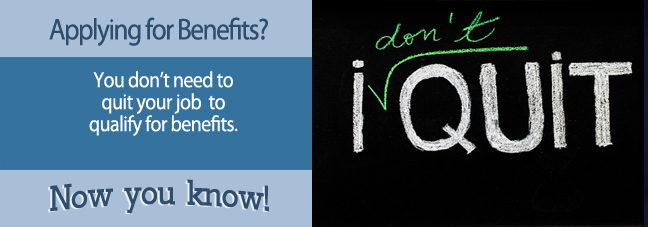Work and Disability Benefits
If you cannot work due to a disability, you may be able to receive disability benefits through the Social Security Administration (SSA) to help you pay for medical bills and everyday living expenses.
Although you may think you need to quit your job to qualify for disability benefits, this is not the case. In fact, if you quit your job during your application process, you need to prove to the SSA that this decision was due to your disability and not so that you could lower your income to qualify for benefits.
Income Limits
If your disability benefits are based on Social Security Disability Insurance (SSDI), which is determined by work history and how much you pay in employment taxes, then your work limits are determined by your substantial gainful activity (SGA).
Your SGA is any work that brings in an amount of income determined by the SSA that shows you are not disabled and can compete in a national economy. For 2025, the SGA income limits are:
- $1,620 per month if non-blind
- $2,700 per month if blind
If you receive Supplemental Security Income (SSI) on the other hand, which is based on financial need, then the amount you can work is based on the federal benefit rate (FBR). The FBR is both the SSI income limit and the maximum amount you can be paid for SSI benefits each month. For 2025, the FBR is:
- $967 if single
- $1,450 if a married couple
Keep in mind that for SSI benefits, not all of your wages will be counted towards the FBR, so technically you can make over $967 or $1,450 per month, as long as you know what counts towards the limit and what doesn’t.
Further Reading: What Is SSI?
Other Factors
Making a low wage does not necessarily mean you are unable to work, and if you are working under those limits, the SSA will still look at the type of work you do to make sure that you are eligible to receive benefits.
For instance, you could hold a volunteer position that requires a lot of physical activity, and the SSA would determine that even if your wages aren’t over the limit, you are able to work. On the other hand, if you make an extremely high wage but work at a job that makes over-the-top accommodations and help for you, the SSA will determine that you should be receiving benefits instead of working, even if your wages are over the limits.
For SSI benefit recipients, you should also keep in mind that all but eight states offer state supplements that add to your monthly payment. These payments range from $10 to $400 per month and may cause your income to go above the FBR limit.
Hourly Limits
While the SSA looks at your wage and type of work more than your hours worked, hourly limits still may come into play. If you are self-employed, such as a small business owner or freelancer, and you become disabled and start to receive payments, the amount of hours you can work is limited to 45 hours per month, which is about ten hours per week. If you think you will qualify for SSDI benefits, you should speak with a disability attorney today.
